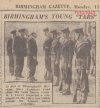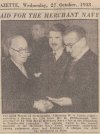'The Merchant Navy, as a service, has no real way of displaying its capabilities. There is no compulsory wearing of uniforms, no street parades led by fine military bands, no pomp or ceremony of any sort to attract the general public or media. The only attention given to the service is when some catastrophe occurs which raises the hackles of the conservationists and this always seems to be to the detriment of the Merchant Navy.
If a Warship is lost, by conflict or dereliction of duty, we never hear the last of it. If a Merchant Ship is lost you seldom hear of it. I wonder how many people would consult Lloyd's List of ships lost world wide in a single year. It runs into hundreds. Ships both large and small, many of them with the loss of all hands and leaving no trace.
Merchant ships of all sizes quietly come and go; they visit ports both large and small throughout the world, carrying the raw materials of trade, oil and petroleum products and the manufactured goods of industry to most countries and have been doing so for centuries.
It is, however, in time of conflict that the Merchant Navy finds itself an indispensable force within the framework of military operations, and even then for safety and security reasons, a low profile is maintained. In wartime, nations with expensive global interests involved in such confrontations look towards their Merchant ships for sea lift capabilities in the transportation of their military personnel, equipment and supplies to wherever - and whenever - they are required, and then to sustain them with the necessary arms and ammunition, fuel and food and all the paraphernalia of war, and then bring everyone safely back home again.
It was an accepted fact of life that the Merchant Navy would go anywhere it was sent without argument and it did just that.
In the Boer War, it was the Merchant Navy who took all of our troops to South Africa and brought them home again safely. There were then no submarines, aircraft or mines to worry about.
In World War l, the first person killed was a Merchant Seaman, when his ship, (a brigantine) was sunk by gunfire from a German submarine in the North Atlantic.
In World War II, again the first person killed was a Merchant Seaman, when a German U-boat sand the liner 'Athenia' off the coast of Ireland, with a large loss of life of crew and passengers. The last person killed after the cessation of hostilities with Germany was also a Merchant seaman, when his ship was torpedoed in the North Atlantic one day after war ended with Germany.
Also, we should not forget that the first ship sunk in the Falklands war was a Merchant Ship - 'Atlantic Conveyor' - with large loss of life of Merchant seamen.
It is not generally known that all Hospital Ships, Royal Fleet Auxiliaries, Armed Merchant Cruisers and most of the so-called 'Woolworths Carriers' of WWII were all crewed by Merchant Seamen who sailed under the Red Ensign (Red Duster), Blue Ensign and the White Ensign (under T124X and T124T agreements).
From passenger liners, troopships to ocean-going tugs, cargo ships to cross channel ferries, troop landing ships and fishing boats, the Merchant Seamen did their job without fuss and very often largely unnoticed.
Merchant Ships are not built for war and merchant seamen are not trained for war, whereas Naval vessels are specifically designed to absorb damage from enemy attack and their crews are highly trained in damage control and gunnery.
We in Australia and New Zealand have a day which is called ANZAC Day. It is a day which is set aside to remember and to pay homage to our fallen comrades. This day was born out of the Gallipoli campaign, but I wonder how many people give a thought to the Merchant Navy involvement in that campaign, for it was the Merchant Ships that took all of our troops into Gallipoli, and in many cases landed our troops on the shores of Gallipoli in the ship's life boats, manned by Merchant Seamen, under constant fire from the Turks.
It is also interesting to note that the great majority of walking wounded in that campaign were rowed in the ship's life boats to the hospital ships which were waiting offshore. All done by Merchant Seamen. It was also the Merchant ships which evacuated most of our troops from Gallipoli to Alexandria, Lemnos and Cyprus and then brought the wounded home.
Who could forget the horrors of the Atlantic Convoys, in ships which in most instances were unable to defend themselves, and were at the mercy of a ruthless enemy day and night for anything up to a month at a time. In the so-called 'Battle of the Atlantic', just under 3000 allied and neutral Merchant ships were sunk by enemy action between 1939 and 1945, with a heavy loss of life.
Those nightmare trips to Archangel and Murmansk, fighting the rigours of an Arctic Winter, while under continuous enemy attack, to see that essential war equipment, supplies and food-stuffs got through to our Russian Allies.
Those very hard-fought convoys to the little but gallant Island of Malta in the Mediterranean, on which so much of the war in the Middle East depended. Whether the ships came from Alexandria or by way of Gibraltar, they were under constant attack while trying to keep open the supply lines to a beleaguered garrison.
One of the greatest sea battles of WWII was 'Operation Pedestal'. This was fought by 14 Merchant ships and a large fleet of Naval ships over five days of continuous warfare - from under the water, on the water and in the air, endeavouring to get essential supplies to Malta in August 1942. I wonder why so many people have never heard of this convoy. Maybe it was just another convoy of Merchant ships. I can tell you this, we lost more men in those five days of fighting than Australia lost in the whole of the Vietnam War.
A convoy of say 45 ships usually had an escort of about 4 or 5 Corvettes and maybe 1 old Destroyer. To give you some idea of the importance of this convoy to Malta of 14 Merchant ships, we had an escort of 2 Battleships, 5 Aircraft Carriers, 7 Cruisers, 22 Destroyers, 7 Submarines and 14 other sundry Naval vessels. With all this escort there were still only 5 Merchant ships survived, 3 of them badly damaged.
In the Indian Ocean, the South Atlantic and in the pacific, the threat of surface raiders and submarines with their mine layers were ever present, and here in Australian home waters and surrounding seas 55 Merchant ships were sunk by enemy action.
Wherever the war was located, Merchant ships were there taking troops and essential supplies to the heart of the action. The traversing of these supply lines by Merchant ships, I think you will agree, was an extremely hazardous occupation. The whole maritime world was their battleground. From the moment they left port, the Merchant ship and her crew were at war, not knowing when the), might be blown up or disabled in some fashion.
A look at some figures of the cost to the Merchant Service deserves some contemplation:- 4996 British and Allied ships lost; 62,933 British and Allied Merchant Seamen were killed in action. Compare this with the 50,758 killed in the Royal Navy and Commonwealth Navies. 4,000 Merchant seamen wounded and 5,000 taken as Prisoners of War.
It has been estimated that the Merchant Service losses amounted to one in six, compared to the combined armed forces of one in thirty-three! It is also interesting to note that of the total casualties of Merchant Seamen; only 8.25% were wounded and 91.75% killed, compared to 79% wounded and 21% killed of all the combined Armed Forces.
During the Falklands War, 43 Merchant ships were taken up from trade, (the first of these within two days of the outbreak of hostilities with Argentina), together with 24 Royal Fleet Auxiliary and Royal Maritime Auxiliary Service Vessels, all manned by Merchant Navy personnel. Merchant ships outnumbered naval vessels in this campaign. Admiral Sir John Fieldhouse, C-in-C Fleet said:¬
'I cannot say too often or too clearly that without the merchant ships taken up from trade and those remarkable merchant seamen, this operation could not have been undertaken, and I hope this message is clearly understood by the British Nation.'
In time of relative peace, Merchant Seamen are quite often confronted by the relics of war, and at times are required to enter areas of unrelated conflict. All these, coupled with the inherent perils of the sea, are all taken in their stride.
To those who survived, there is an obligation to ensure that those who were less fortunate are not forgotten, whether they be shipmates, friends serving in other ships, or bound to us by the 'brotherhood of the sea' We are proud to be known as Merchant Seamen.
John Curtin, our wartime Prime Minister said of the Merchant Seaman: 'Whenever you see a man in the street wearing the distinctive MN. badge, raise your hat to him because without these gallant men the war would be lost!'
Winston Churchill said on the 27th of January, 1942: 'But for the Merchant Navy who bring us the food and munitions of war, Britain "would be in a parlous state and indeed, without them, the Army, Navy and Air Force could not operate'
John A. Beasley, the wartime Minister of Supply and Shipping said on the 6th of March 1943: 'With due deference to the splendid services of the armed forces, I can say that the recent operations around New Guinea and the South Pacific would not have succeeded but for the magnificent work and courage of the Merchant Navy.'
H.M. King George VI said: 'The task of the Merchant Navy is no less essential to the people's existence than that allotted to the Navy, Army and Air Force, and indeed, none of them would be able to operate without these brave men.'
And finally, in October 1945 a tribute was paid to the Merchant Navy by the British Houses of Parliament which said: 'The Minister of War Transport has been informed by the Lord Chancellor and by the Speaker of the House of Commons of the terms of the Resolutions in identical terms passed by both Houses of Parliament without dissent on the 30th October 1945, of which he has been requested to communicate the following portion to :'Masters, Officers and Men of the Merchant Navy: -
That the thanks of this House be accorded to the Officers and Men of the Merchant Navy for the steadfastness with which they maintained our stocks of food and materials; for their services in transporting men, munitions and fuel to all the battles over all the seas; and for the gallantry with which, though a civilian service, they met and fought the constant attacks of the enemy.
That this House doth acknowledge the Merchant Navy with humble gratitude and the sacrifice of all those who, on land or sea or in the air, have given their lives that others today may live as free men, and its heartfelt sympathy with their relatives in their proud sorrow. We shall never forget them.'
Ladies and gentlemen - we were forgotten!
IN MEMORIAM, MERCHANT NAVY, 1939-1945.
No cross marks the place where now we lie. What happened is known but to us. You asked, and we gave our lives to protect our land from the enemy curse. No Flanders Field where poppies blow; no Gleaming Crosses, row on row; No Unnamed Tomb for all to see, and pause - and wonder who we might be. The Sailors' Valhalla is where we lie on the ocean bed, watching ships pass by. Sailing in safety now thru' the waves, often right over our sea-locked graves.
We ask you just to remember us.
(By Captain Peter A. K. Boswell, M.C.)
- The Merchant Service at War - by Captain P. Andrews




